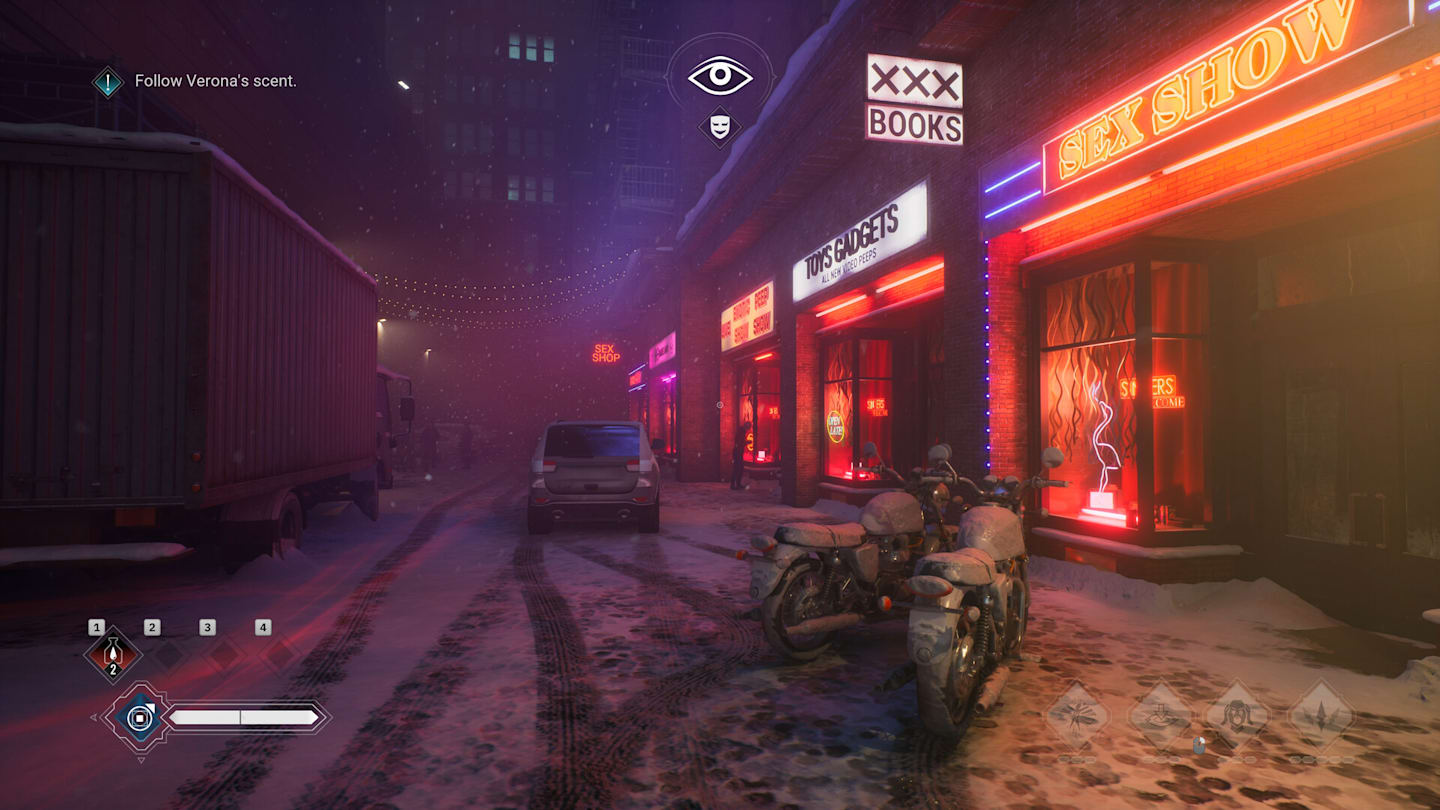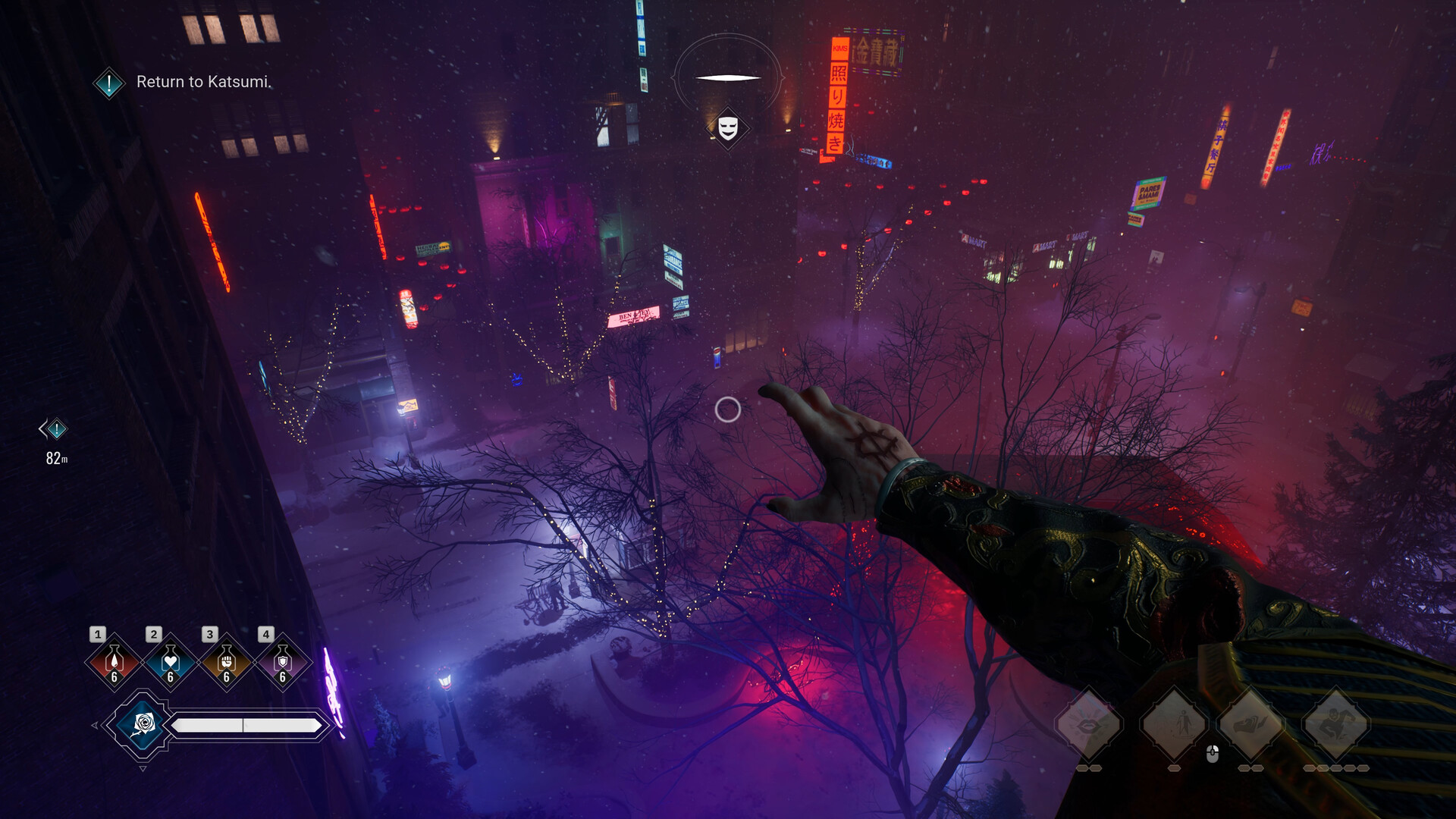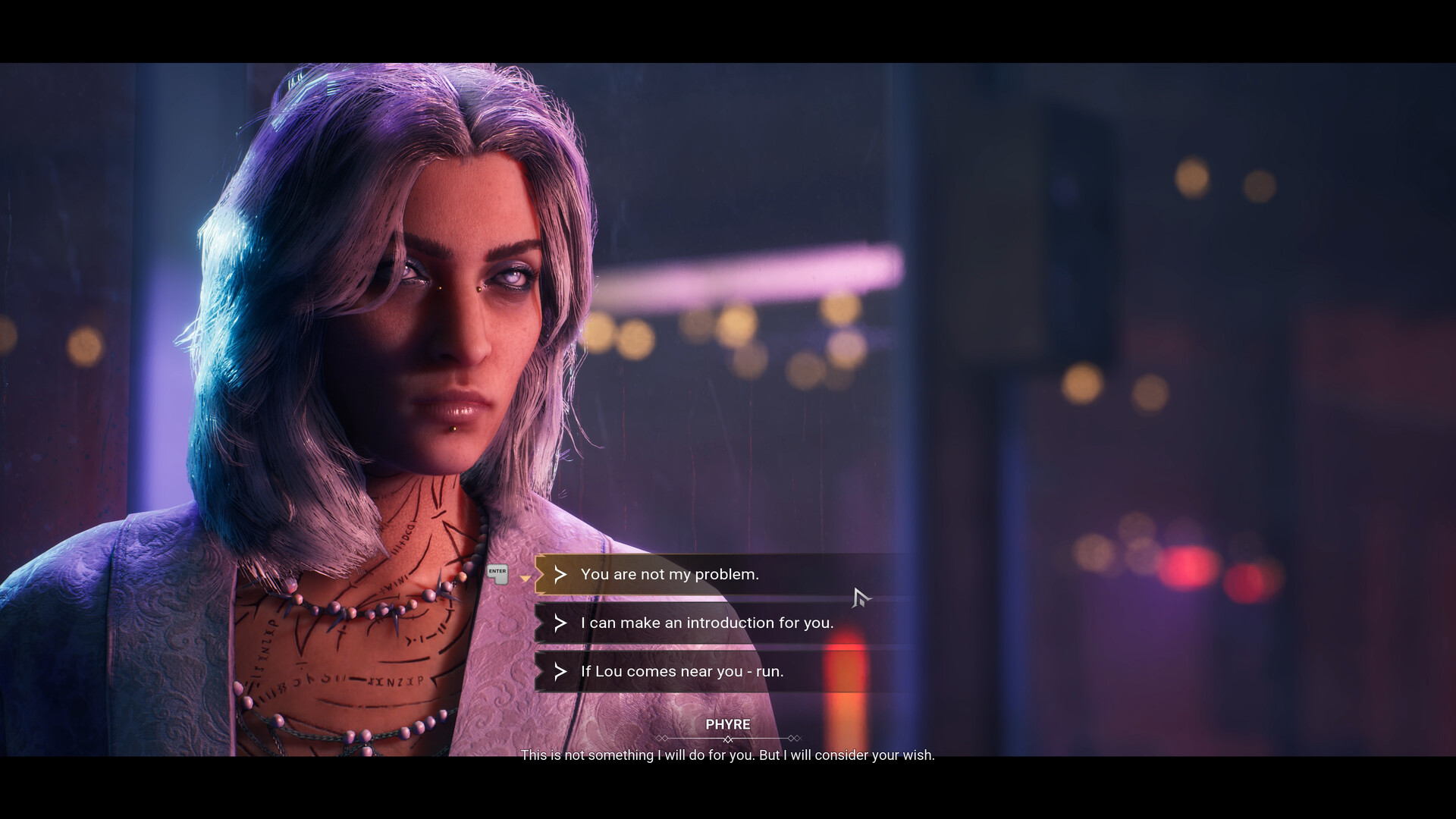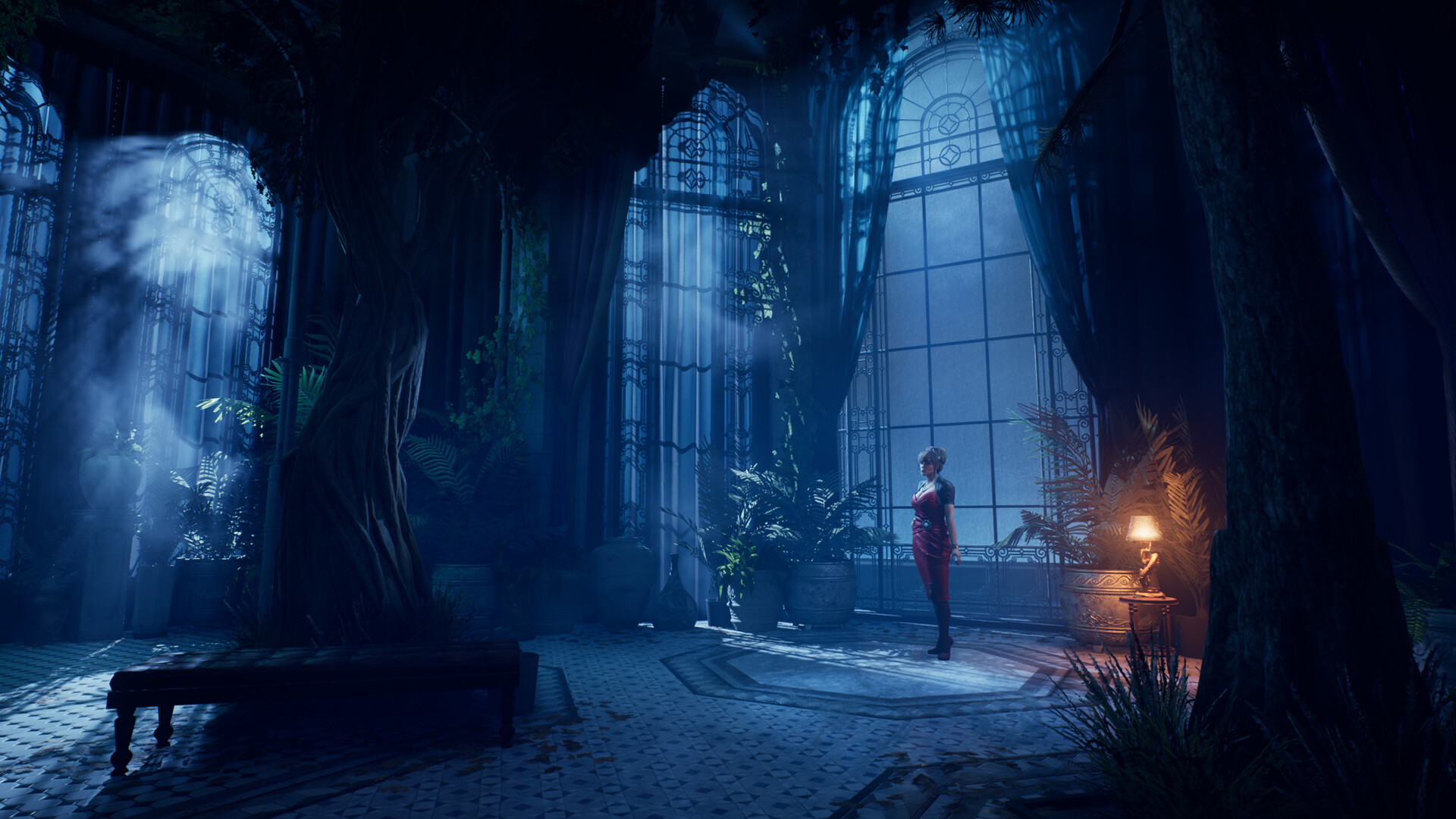
You are the Nomad, an ancient vampire who has just woken up after a century of sleep, finally enjoying a peaceful existence – until someone disturbs it. You have a mysterious mark on your hand – a nod to the game Dishonored – and your full potential remains untapped. To top it all off, you’re haunted by the voice of a witty, sarcastic vampire detective who happens to love fedoras.
It’s a snowy Seattle night, filled with the glow of neon and Christmas lights. The city is practically shut down by the weather, and you’re caught in the middle of it all. Your mission: search for the body of a mysterious passenger, a hunt that will lead you through the city’s hidden vampire hangouts – from dimly lit bars to smoky jazz clubs – constantly moving between the warmth inside and the frigid night.
Even though you and the other person have different backgrounds, you quickly establish a friendly relationship and share a common goal: figuring out how you both came to be in this strange situation. This dynamic is similar to what we’ve seen in games like Cyberpunk 2077 with Johnny Silverhand and Batman: Arkham Knight with The Joker, but without the conflict and hostility.
The game cleverly uses flashbacks to explain how an ancient vampire quickly adapts to modern life – avoiding awkward explanations and instead smoothly delivering backstory. These flashbacks, set during the prohibition era, also control the game’s pace. Each day you play as the main character, Nomad, is framed by a playable memory of a detective investigating serial murders that connect to the present-day story.

This unlikely partnership isn’t quite as classic as some, but it’s still a strong one. The detective is inspired by classic noir stories, but he’s more playful and humorous than dark and pessimistic. Because he’s familiar with the key figures in vampire society – creatures who’ve become eccentric and jaded with age – you’re always prepared for challenging conversations, which helps you navigate the complicated and shadowy world of vampires.
Paradox Interactive, known for strategy games, and Bloodlines 2 have formed an unexpected, yet successful partnership. Four years ago, the original development team, Hardsuit Labs, was replaced by The Chinese Room. They essentially started from scratch, reimagining the sequel to the classic immersive sim as a first-person action RPG. It’s remarkable the game was completed at all, and even more surprising that it’s good, considering the unusual combination of publisher and developer – a team not typically known for this type of game. It feels like a lucky break!
I really enjoyed the original Bloodlines, but it’s important to understand what this game is. It’s not a true immersive sim. While you have a lot of different abilities and ways to play, those abilities don’t combine and interact like they do in games designed as immersive sims. There are moments where things happen unexpectedly – particularly when different groups of enemies fight each other – and you can sneak around in air vents, but those aren’t central to the gameplay.
The game’s levels are simple to navigate, offering a few sneaky paths and climbable spots, but most areas turn into all-out battles. Stealth is useful for reducing enemy numbers before a fight, rather than completing the game undetected. You usually can’t progress until all enemies in an area are defeated. While it’s an action RPG, the combat feels more like *Ghostwire Tokyo* than the stealth-focused gameplay of the original *Dishonored* – a comparison that some fans might not appreciate. However, the developers have successfully captured the overall atmosphere and feel of the series.

While Bloodline 2 lets you do amazing physical feats like fighting and parkour, some of the most engaging parts of the game are the conversations. You’ll need to carefully analyze each vampire you meet and respond in a way that satisfies them, all while keeping your own goals hidden.
The Masquerade is a set of rules for vampire roleplaying, focusing on keeping their true nature hidden from humans. But it’s also about the complex social game vampires play with each other – maintaining appearances, building alliances, and subtly maneuvering for power. It’s a constant performance of loyalty and deception, where saying the right thing is as important as survival. The game is exceptionally well-written, drawing you into the intrigue and drama of every interaction.
However, this deeper story development is limited to the main storyline. While you learn about side characters through the main quests, their individual tasks are mostly just repetitive chores and errands – simply a way to gain new abilities or unlock intimate scenes (which are implied, not shown). I found the game much more enjoyable around the halfway point when I stopped focusing on these side activities altogether.
Despite some clunky combat and a world that looks beautiful but feels a bit lifeless, the main story is full of unexpected twists and memorable scenes. The environment is visually stunning, with detailed streets, shadowy alleys, and realistic sounds like music, sirens, and conversations. However, the city’s inhabitants mostly serve as quest givers or enemies, preventing the world from feeling truly dynamic and lived-in.
The combat system is unique and helps immerse you in the game’s world. You can use different vampire abilities to approach enemies stealthily, control them, or take them down. You might temporarily turn foes into allies, cause them to explode, or quickly vanish and teleport when things get tough. To recharge your powers, you need to sneak up on or weaken an enemy and bite them – it’s similar to a powerful finishing move in Doom, but you’re left vulnerable while doing it.

This character has quick, automatic attacks that target the closest enemy. You can also charge up a strong punch or dodge to perform different moves, including kicks if you’re playing aggressively. There’s a sliding kick that targets opponents’ knees, and a jumping kick that often misses and sends you tumbling forward. The game can be challenging on Normal and Hard modes, but using telekinesis strategically can help you stay in control.
Okay, so the telekinesis in this game is absolutely insane. I mean, I can grab pretty much anything and do whatever I want with it. Seriously, explosive barrels to wipe out groups, saving people from falling, even picking up guns and firing them while they float next to me – then chucking the gun *at* their heads after. It doesn’t stop there, though. I can literally rip heads off and use *those* as projectiles. There was this one fight where I decapitated a guy, grabbed his head with my powers, slowed down time, and yeeted it at his buddy. Then I just walked around behind him while he was reeling from… well, a remote headbutt, basically. He did *not* see that coming! When you really get into the flow, it’s super fast-paced and satisfying, but honestly, the game’s performance sometimes struggles to keep up with all the chaos.
Okay, so I’ve been playing Bloodlines 2 on the PS5 Pro, even with the performance mode turned on, and honestly, it still stutters. It’s especially noticeable during all the crazy action bits and when you’re running around doing parkour. It doesn’t completely break the game, but it happens *a lot*, and it definitely makes me think those rumors about Unreal Engine games having technical issues aren’t going away anytime soon. Just a heads-up – be aware of that when you jump in.
Even with some flaws in its side quests, technical performance, and combat, I’m happy I experienced Bloodlines 2. It’s a remarkable game, especially considering its publisher’s history and the developer’s usual focus on slower, more atmospheric titles. They took over a troubled project and really made it their own, and the result is surprisingly excellent. When you’re immersed in the game – navigating dark streets, dealing with complex politics, solving disturbing crimes, and listening to the city come alive – Bloodlines 2 completely captivates you and doesn’t let go until the very end.
Read More
- The 11 Elden Ring: Nightreign DLC features that would surprise and delight the biggest FromSoftware fans
- 10 Hulu Originals You’re Missing Out On
- 2025 Crypto Wallets: Secure, Smart, and Surprisingly Simple!
- TON PREDICTION. TON cryptocurrency
- Gold Rate Forecast
- Bitcoin and XRP Dips: Normal Corrections or Market Fatigue?
- The Gambler’s Dilemma: A Trillion-Dollar Riddle of Fate and Fortune
- Walmart: The Galactic Grocery Giant and Its Dividend Delights
- Bitcoin, USDT, and Others: Which Cryptocurrencies Work Best for Online Casinos According to ArabTopCasino
- Is Kalshi the New Polymarket? 🤔💡
2025-10-17 16:39